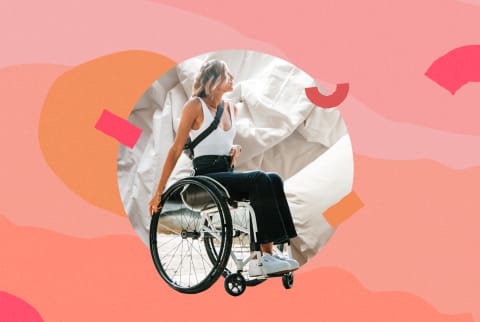Advertisement
4 Common Misconceptions People Still Have About Sex & Disability


December 3 is National Disability Day, and there's no better day to talk about one of the most persistent misconceptions around disability: that disabled people don't have sex. Wrong! Let's break this down, one myth at a time:
Myth #1: Disabled people are not sexual.
"One of the most frustrating myths is that disabled people don't have desires. Like all we should be focusing on is accessibility and nothing else," Andrew Gurza, disability awareness consultant and host of Disability After Dark, tells mbg.
Disabled people are frequently and wrongfully desexualized by others. Some disabled people are asexual (just like in the general population), but many aren't. "I have a ton of desires sexually, and I wish that I had a space to be disabled and express them. My sex drive is often higher due to the fact that I often don't have access to my own disabled body, so the idea that I don't have desires is just false," Gurza says. Gurza created the excellent viral #DisabledPeopleAreHot hashtag on Twitter, giving disabled people space to show off just how sexy they are.
"Everyone is a sexual being, whether they have a disability or not. We are all sexual beings from birth to death," Katherine McLaughlin, M.Ed., an AASECT-certified sexuality educator who teaches workshops around sex and disability, tells mbg.
Myth #2: Disabled people "can't" have sex.
Some people assume disabled people, particularly wheelchair users and other folks with disabilities that affect mobility, simply "can't" have sex physically. Often this assumption ties in with another broader misconception: that sex necessarily involves penetration, specifically penis-in-vagina intercourse. Of course, the truth is sex comes in many different forms other than that, which is true for people of all abilities. Depending on their particular disability and their personal preferences, some disabled people enjoy p-in-v intercourse; some enjoy other kinds of penetrative sex; some are all about touch; some folks go to town with sex toys—there are all kinds of sexual possibilities here. Even nipples, knees, and earlobes can be sites of intense sexual pleasure.
Gurza adds, "When I was younger and coming into my sexuality as a queer disabled person, my desires didn't incorporate my disability, but now as I mature, my desires definitely include sex in my wheelchair and finding ways to make my disability part of the sex."
Myth #3: Disabled people's relationships are "cute," "inspiring," or otherwise unique.
"Sometimes couples with disabilities get referred to as cute, similar to the elderly," McLaughlin explains. This can be condescending and unhelpful, making it seem like disabled people's relationships are somehow less real or less legitimate than other people's relationships. Disabled people are also not your inspiration, which is another common way able-bodied people can sometimes frame people's disabilities. Disabled people are not here to make able-bodied people feel better about themselves, and they're not "brave" for simply existing in their bodies and having normal human relationships.
Myth #4: Disabled people need protection, like kids.
McLaughlin says disabled people often get treated as if "they are childlike and need protection, especially those with developmental disabilities." This might look like people talking louder or in a babying tone around disabled people, for example, and this infantilization can also have direct sexual consequences, such as adults and health care providers refusing to talk to disabled teens and people about sexual health because of assumptions that the information isn't relevant to them.
"They are not children. They are their biological age. All 18-year-olds, whether they have a disability or not, need the same information," she says. Another way this infantilization affects disabled people's sex lives: "We keep our kids close to protect them, so [some parents or caregivers] may not let a person with a disability date or have privacy with a partner because we see them as children and not the adults they are."
Here's the bottom line: Everyone has the right to intimacy, sexual expression, and romance. Disabled people like and enjoy sex just like everyone else, and we need to make sure our conversations about sex are inclusive of all abilities and that disabled people have the space to explore their desires.